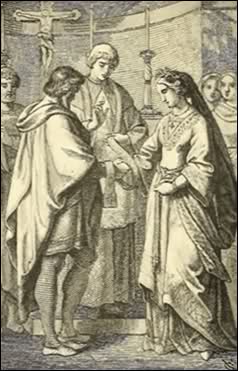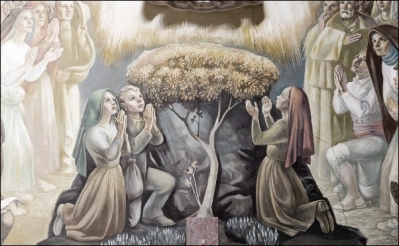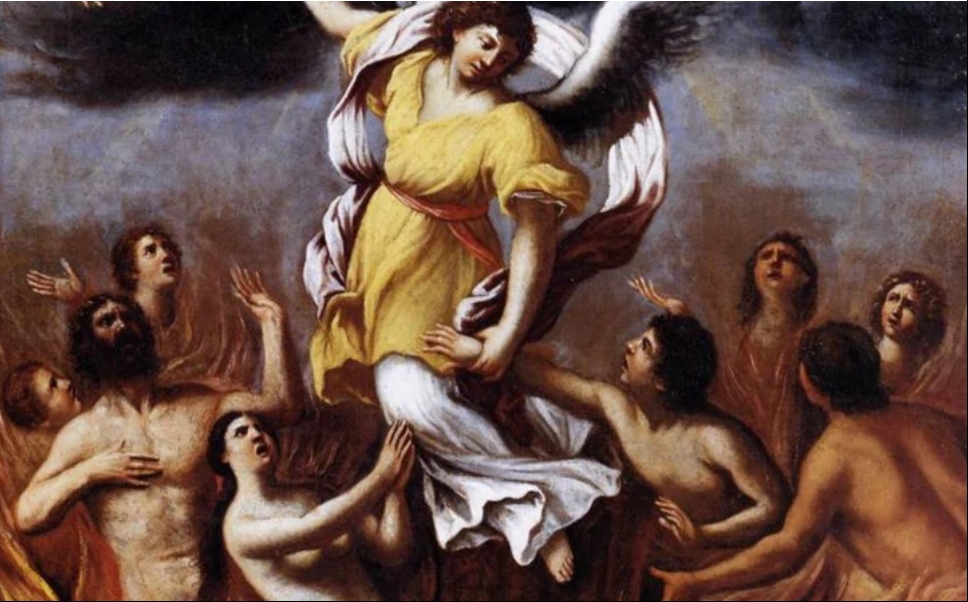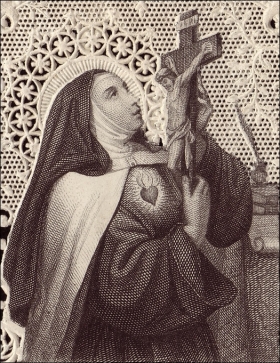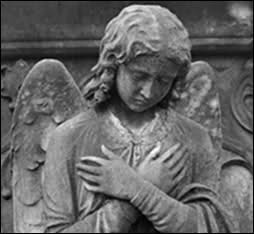The Patience of the Saints and the Sleep of Death

And we will not have you ignorant brethren, concerning them that are asleep, that you be not sorrowful, even as others who have no hope.
For if we believe that Jesus died and rose again: even so them who have slept through Jesus, will God bring with Him. (1Thes:4:13-14)
One great miracle in the new creation of God is this, that death is changed to sleep; and therefore in the writings of the New Testament we do not read of the ‘death ‘ of the saints.
St. Paul in the text speaks of the saints unseen as of those that ‘sleep in Jesus’; and Christians were wont to call their burial-grounds cemeteries, or sleeping-places, where they laid up their beloved ones to sleep on and take their rest. Let us see why we should thus speak of those whom we call dead.
First, it is because we know that they shall awake up again. What sleep is to waking, death is to the resurrection. It is only a prelude, a transitory state, ushering in a mightier power of life; therefore death is called sleep, to show that it has a fixed end coming
Again, death is changed to sleep, because they whom men call dead do really live unto God. They were dead while they lived this dying life on earth, and dead when they were in the last avenues of death. But after they had once died, death had no more dominion: they escaped as a ‘bird out of the snare of the fowler’; the snare ‘was’ broken, and they were delivered.
It may sound strange to unbelieving ears to say that we are dead while we live, and alive when we die. But so it is. Life does not hang on matter, nor on organization of matter.
It is not as the harmony which rings out of a cunning instrument; but it is a breath, a spirit, a ray of the eternal being, pure, immaterial, above all grosser compounds, simple and indissoluble. In the body it is allayed and tempered with weakness, shrouded about with obstructions; its faculties pent up by a bounded organization, and its energies repressed by the ‘body of this death.’ It is life subjected to the conditions of mortality. But, once dead, once dissolved, and the unclothed spirit is beyond the affections of decay. There is no weakness, nor weariness, nor wasting away, nor wandering of the burdened spirit; it is disenthralled, and lives its own life, unmingled, and buoyant. When the coil of this body is loosed, death has done all and his power is spent; thenceforth and for ever the sleeping soul lives mightily unto God.
Those whom the world calls dead are sleeping, because they are taking their rest. ‘I heard a voice from heaven saying unto me, write, Blessed are the dead which die in the Lord, from henceforth. Even so saith the Spirit; for they rest from their labours.’ Not as the heretics of old vainly and coldly dreamed, as if they slept without stir of consciousness from the hour of death to the morning of the resurrection. Their rest is not the rest of a stone, cold and lifeless; but of wearied humanity. They rest from their labours; they have no more persecution, nor stoning, nor scourging; no more martyrdoms; they have no more false witness, nor cutting tongues; no more bitterness of heart, nor iron entering into the soul; no more burdens of wrong, nor amazement, nor perplexity. Never again shall they weep for unkindness, and disappointment, and withered hopes, and desolation of heart. All is over now; they have passed under the share. The ploughers ploughed upon their back, and made long furrows; but it is all over, never to begin again.
They rest too from the weight of ‘ the body of our humiliation’ —from its sufferings and pains. Their last sickness is over. . . . Now is their weariness changed into refreshment; their weakness into excellence of strength; their wasting into a spirit ever new; their broken words into the perfection of praise; their weeping into a chant of bliss. And not only so, but they rest also from their warfare against sin, against all its strength, and subtilties, and snares. . . . There is no more inward struggle, no sliding back again, no swerving aside, no danger of falling; they have gained the shore of eternal peace. Above all they rest from the bufferings of evil in themselves. It is not persecution, nor oppression, nor the thronging assaults of temptation, that so afflict a holy man, as the consciousness that evil dwells in his own inmost soul. It is the clinging power of spiritual evil that sullies his whole being: it seems to run through him in every part; it cleaves to every movement of his life; his living powers are burdened and bruised by its grasp.
Evil tempers in sudden flashes, unholy thoughts shooting across the soul and kindling fires in the imagination, thoughts of self in holiest seasons, consciousness of self in holiest acts, in devoutness of spirit, earthliness of heart, dull musing heaviness in the life of God—all these burden even saints with an oppressive weight. They feel always the stretch and tension of their spiritual frame, as a man that is weary and breathless grappling with a foe whom, if he would live, he must hold powerless to the earth. But from all this, too, they rest. The sin that dwelt in them died, when through death they began to live. The unimpeded soul puts forth its new-born life, as a tree in a kindly soil invited by a gentle sky: all that checked it is passed away; all that draws it into ripeness bathes it with fostering power. . . .
Blessed and happy dead! In them the work of the new creation is well-nigh accomplished. What feebly stirs in us, in them is well-nigh full. They have passed within the veil, and there remaineth only one more change for them—a change full of a foreseen, foretasted bliss. How calm, how pure, how sainted, are they now! A few short years ago, and they were almost as weak and poor as we: harassed by temptations, often overcome weeping in bitterness of soul, struggling, with faithful though fearful hearts, towards that dark shadow from which they shrank as we shrink now. . . .
Let us be much in thought with them that are at rest. They await our coming; for without us they shall ‘not be made perfect.’ Let us therefore remember, and love, and follow them; that when our last change is over, we, with them, may ‘ sleep in Jesus.’
Cardinal H. E. Manning (1808-1892)
When Even Wolves Kept Their Word…
 St. Francis of Assisi – October 4
St. Francis of Assisi – October 4
During the time that St. Francis was preaching in Gubbio, an enormous and ferocious wolf appeared in that area. It not only devoured other animals, but also men; and since it often came near the town, the inhabitants were taken by great fear. When the people went out to the fields, they would go armed as if for combat. Nonetheless, if any of the townspeople, even if armed, came upon it alone, he could not defend himself against it. The fear of this wolf became so great that no one had the courage to go beyond the city walls.
St. Francis, however, decided to go and meet the wolf, although all the inhabitants counseled him not to do so. Making the Sign of the Cross and putting all his trust in God, he walked out of the town with his brothers. At a certain point, his companions feared to go further, so St. Francis continued alone on the road that led to the place where the wolf stayed.
Many townspeople were following him from the distance to see what would happen. This is what they saw: The wolf advanced toward St. Francis with its mouth open. Approaching him, St. Francis made the Sign of the Cross and called out to the wolf saying: “Come here, brother wolf. In the name of Our Lord Jesus Christ, I order you not to do any harm to me or any other person.”
Then a marvelous thing happened! As soon as the Saint spoke those words, the wolf closed its mouth, stopped advancing, and meekly laid itself down at the feet of St. Francis as if it were dead.
Then St. Francis spoke to the wolf: “Brother wolf, you are doing much harm and have committed great evils in this land, destroying properties and killing the creatures of God without His permission. You have not only killed and devoured animals, but you have dared to kill men, made in the image and likeness of God. For this, you deserve to be hanged as the terrible thief and murderer that you are. The people clamor and murmur against you, and this entire land is your enemy. But I want, brother wolf, to make peace between you and them, so that you will no longer offend them and they will forgive your past crimes, and neither men nor dogs will chase you any longer.”
As he finished saying these words, the wolf moved its body and tail and bowed its head to show that it had accepted the Saint’s proposal. Then St. Francis said: “Brother wolf, since you wish to accept and keep this peace, I promise you that the men of this land will always feed you while you live so that you will not be hungry, for I know well that it was out of hunger that you have done so many evils. But in granting you this great grace, I want you to promise me never to harm any man or animal. Do you promise this?”
The wolf, bowing its head, made an evident sign of agreement. Still not satisfied, St. Francis asked: “Brother wolf, I want you to give me a pledge of this promise, so that I can trust in it fully.” St. Francis extended his hand to receive the wolf’s pledge, and the wolf raised its right paw and meekly put it in St. Francis’ hand, giving him the requested guarantee.
Then St. Francis said: “Brother wolf, in the name of Our Lord Jesus Christ I command you to follow me without any fear, so that we may conclude this peace in the name of God.” And the wolf obediently followed him into the city as if it were a docile lamb. The townspeople marveled greatly at this, and the news spread quickly through the entire city so that everyone, men and women, great and small, young and old, went to the public square to see St. Francis with the wolf.
When all the people were gathered together there, St. Francis arose and preached to them with these words: “It is because of our sins that God permits calamities like this. Much more dangerous than the fury of a wolf, which can only kill the body, are the flames of Hell that will last eternally for those condemned. See how such a great multitude fears the mouth of a little animal, but you should fear the mouth of Hell much more. Make, sincere penance for your sins, therefore, and God will free you now from the wolf, and in the future from the infernal fire.”
St. Francis continued: “Listen to me, my brothers. Brother wolf, who is here before you, has promised and pledged to me to make peace with you and not offend you in anything as long as you promise to give it the food it needs each day. I offer myself as surety that it will strictly observe this pact.
All the people in unison promised to feed it always. And before all St. Francis said to the wolf: “Brother wolf, do you promise to observe with these people a pact of peace, offending neither any human creature nor his belongings?” The wolf knelt down and inclined its head, and with subdued movements of its body showed that it wanted to observe the entire pact.
But still St. Francis said: “Brother wolf, the same way you made your pledge to me outside the walls, I want you to give me assurance of your promise before all the people, that you will not deceive me about the surety I offer on your behalf.” Then the wolf, raising its right paw, put it in the hand of St. Francis.
After all this took place, there was such great joy and admiration among the entire people, both because of the virtue of the Saint and the novelty of the miracle, that all began to shout to Heaven, praising and thanking God for sending them St. Francis, who by his merits had freed them from the jaws of that ferocious beast.
After that, the said wolf lived two more years in Gubbio. It would enter docilely into the houses, going from door to door, without harming anyone and not being harmed by anyone. It was courteously fed by the people, and as it went about through the houses and city, no dog ever barked at it or chased it. When the worf died of old age after two years, all the townspeople mourned the loss greatly because in seeing it walking through the city so tame, they were better reminded of the virtue and charity of St. Francis of Assisi.
http://www.traditioninaction.org/religious/h023rp.FrancisWolf_OReilly.html
Feast Day of St. Joseph, March 19, 2012
Behold a faithful and wise servant, whom the Lord hath set over His household.
V. Glory and riches shall be in his house.
R. And his justice endureth for ever and ever.
Happy and blessed art thou, O St. Joseph, to whom it was given, not only to see and to hear The God whom many kings desired to see and saw not and to hear and heard not; but also to bear Him in thine arms, to embrace Him, to clothe Him, and to guard and defend Him.
Pray for us, O Blessed St. Joseph.
The Communion of Saints
Church Triumphant, Church Militant, Church Suffering
For as in one body we have many members, but all the members have not the same office: so we being many, are one body in Christ, and every one members one of another. ROM. xii. 4, 5
Few other tenets of Catholic belief and practice have been combated by the religious revolutionists of the sixteenth century with such persistent violence as that Of “The Communion of the Saints “ yet few other tenets of Catholic belief and practice are so solidly grounded in Scripture and Tradition, or afford to the Christian soul so much sweetness of thought, so much hopefulness of life and action.
For ages the Apostles Creed reechoed through Christendom “ I believe in the “Communion of the Saints” and to this article of the Creed solemn significance was given in universal ritualistic observance. Suddenly all was changed. ”Justification by faith alone“; the vital, though most erroneous principle of the new religion, was the argument for the exclusion of all secondary or mediate intercession. The Saints, those on earth or those in Heaven, it was said, must be silenced. Intervention on their part is needless. It is injurious to the Saviour of Calvary. It indicates either in the Saviour insufficiency of power and merit, or in the believer insufficiency of personal appropriation of the fullness of salvation proffered by Him to mankind. Henceforward, the article in the Creed “I believe in the Communion of the Saints” “was to be a mere verbal expression, void of substantial meaning or living reality.
Much more that the Saints be once forever ejected from prerogatives and privileges heretofore accorded to them, war was waged against their names and memories, against things whatsoever that might recall them to the Christian mind, or suggest recognition of their deeds of holiness. The doctrine of “ The Communion of the Saints“ as interpreted and reduced to practice by the Catholic Church, before and after the so-called “Reformation” was distorted and calumniated to the end that seen only under a vile and blackened image, it be abominated the more cordially and buried the more deeply in abiding oblivion. The recognition of the Saints, as known in the Catholic Church, it was said, is rank superstition, degraded idolatry: to invoke their intercession, to venerate their virtues, to picture them in stone or on canvas, is the revival of olden paganism. Thus inaugurated, opposition to the Saints traveled down the centuries, though here and there somewhat shorn of its asperity as justice and common sense were allowed a hearing. The opposition lives to-day. Even to-day the Saints need to be defended. Misrepresentation must be denied, and truth set forth in its full armor of defense.
What is “The Communion of the Saints” It is the fellowship of mutual love and help among the sons of Christ, members of His mystic body, the Church, whether still battling for salvation on earth, or reigning in bliss in Heaven, or enduring for a time the cleansing fires of Purgatory. “There is no other name under Heaven given to man, whereby he must be saved “no other name than that of Jesus, Redeemer and Saviour. Jesus is sole Redeemer, sole Mediator, the sole One, capable of bringing God to man, and man to God this, certainly, the indubitable and uncontestable teaching of the Christian dispensation. None may doubt this teaching: none may set up, in doctrine or practice, aught to impair, in slightest iota, its over-mastering integrity. The supremacy of Jesus, as Redeemer and Saviour, was at all times the solemn asseveration of the Christian religion: it is to-day the solemn asseveration of the Catholic Church.
Whence, then, the intercessory function attributed to the Saints by the Catholic Church, clearly implied, the Church teaches, in the article of the Apostles Creed “I believe in the Communion of the Saints “? We answer: From the free-willed ordering of the Redeemer and Saviour Himself, due altogether to His love and merciful condescension.
In the Christian dispensation love is supreme. The whole dispensation had its birth in God s eternal love for mankind: its whole course through time was to be the outward effusion of this love. As one of the effects of this love, the Incarnate Word willed that men be united to Him in closest, most intimate bond, even to become, as it were, members of His own body : “Now” writes St. Paul, “you are the body of Christ, and members of member.” And, then, as the consequence of their union with Himself, He willed that they be united with one another, even to become members of one another: “So we being many are one body in Christ, and every one members one of an Other” And, further, in result of their mutual love, He ordered that they help one another: “That there might be no schism in the body, but the members might be mutually careful one for another”. Thence the privilege of the members to intercede one for an other. As a token of His love for His members, as an encouragement to them to love one another, He, the Head, authorizes the members to take, through petition, one for another graces from the divine treasury, and in this manner, in a degree otherwise impossible, to be mutually “careful one for another” “The Communion of the Saints” in its intercessory function, is one of the many beauteous blossomings of that mysterious love for mankind which bade the eternal Word from Heaven to Bethlehem, from Bethlehem to Calvary.
In the prerogative of intercession given to the members of the body of Christ no shadow is there of infringement upon the mediatorship of the one Saviour: no shadow of substitution of human for divine merit. The Saints offer prayers that through His love and mercy the merits of the Saviour be applied to fellow members of the same mystic body. When we address the Saints, we ask for their intercession. We say to them: “Pray for us”. Never to the Saints do we say: Grant us grace, grant us salvation. To grant grace and salvation is the privilege solely of Him who merited grace, who alone is entitled to dispose of it. Before Him the Saints are as having nothing: outside of Him the Saints, however high in favor, are power less of will and void of hand to help us.
But why in any manner bring the Saints into action? Why not at once mount to the Source of grace, and there without aid from other creatures take immediate draught from its all-copious flow? No absolute need, indeed, is there of the company of the Saints, when we present ourselves before the Great Mediator: to Him the road is always open: alone we may travel it: alone we often do travel it. Yet, there is a signal advantage in approaching Him hand in hand with fellow members of His mystic body. The Great Mediator is pleased when His members put into practice His man date that they love one another, that they be mutually “careful one of the other” And, then, our prayers for love and mercy reach the Throne of Grace, worthier and more compelling when mingled with the prayers of others, nearer and dearer to Jesus. Slight our personal value: poor and weak our claims upon the divine treasury. The prayers of the Saints united with our prayers, the deeds of the Saints are made ours. Not we, unworthy ones, who then pray, but those more beloved of God, whose titles to a hearing He more readily acknowledges.
Catholic Sisters and the American Civil War
In Washington, D.C., across from St. Matthew’s Cathedral (the site of President John F. Kennedy’s funeral Mass), a monument stands to the women religious who ministered to wounded and dying soldiers, North and South, during the American Civil War. Unveiled on September 20, 1924, the inscription reads:
They comforted the dying, nursed the wounded, carried hope to the imprisoned, gave in his name a drink of water to the thirsty –
To the memory and in honor of the various orders of Sisters who gave their services as nurses on battlefields and in hospitals during the Civil War.
Between 1861 and 1865, approximately 640 women from twenty-one different religious communities volunteered their nursing services. Mary Livermore, a future women’s rights leader who worked with the U.S. Sanitary Commission, said:
I am neither a Catholic, nor an advocate of the monastic institutions of that church . . . But I can never forget my experience during the War of the Rebellion . . . Never did I meet these Catholic sisters in hospitals, on transports, or hospital steamers, without observing their devotion, faithfulness, and unobtrusiveness. They gave themselves no airs of superiority or holiness, shirked no duty, sought no easy place, bred no mischiefs. Sick and wounded men watched for their entrance into the wards at morning, and looked a regretful farewell when they departed at night.
This was quite a change. Before the Civil War, nuns often didn’t wear habits in public or when traveling, because of anti-Catholic hostility. In Indiana, children threw rocks at them. In New England, anti-Catholic mobs threatened to burn down their convents (and sometimes actually did). And in New York, a man walked up to a Sister in habit, called her a “damned papist bitch,” and slapped her face.
But when the war came, they were desperately needed. In general, nursing wasn’t considered a respectable profession for women. Nor were there many hospitals; most people were cared for at home. The exceptions here were the Sisters, who operated twenty-eight hospitals nationwide as of 1861. While other churches had women nurses, including the Lutherans and Episcopalians, Catholic nuns constituted the single largest pool of experienced nurses in America on the eve of the Civil War.
Altogether on both sides, over 4,000 women served as nurses; more served as nurses’ assistants, cooks, and laundresses. What did the nurses do? They cleaned wounds and bandaged them, helped doctors in surgery, and cleaned the wound. It wasn’t easy work, and the turnover rate was high. All in all, it was hard, ugly work.
The turnover rate may have been less for the Sisters. For centuries, historian George Stewart writes, nursing was a “religious ministry rather than a profession.” One Sister, asked how she gathered strength to do her work, said: “I thought of the cruel wound in the side of our dear Lord, and my strength was restored.” And they asked little remuneration beyond necessities.
They were there on the war’s bloodiest battlefields. At Shiloh, where some 25,000 fell, Sister Anthony O’ Connell, a Cincinnati-based Sister of Charity, said she was unable to bear the terrific stench from the bodies on the battlefield. This was bad enough, but what we endured on the field of battle while gathering up the wounded is beyond description . . . Day often dawned on us only to renew the work of the preceding day without a moment’s rest.
One soldier said of Sister Anthony:
Amid this sea of blood she performed the most revolting duties for these poor soldiers. She seemed like a ministering angel, and many a young soldier owes his life to her care and charity. Happy was the soldier who, wounded and bleeding, had her near him to whisper words of consolation and courage. She was reverenced by Blue and Gray, Protestant and Catholic alike; and we conferred on her the title of the ‘Florence Nightingale of America.’ Her name became a household word in every section of the North and South.
When surgeons wanted to amputate a soldier’s limb, she would say: “Wait and let me see what I can do for him.” And she often saved it. In 1897, she was buried with a full military honor guard.
In some quarters, however, particularly among Protestant nurses, prejudice still lingered. One woman, describing the Sisters’ habit, said: “What looking objects to wait upon our sick and dying boys!” Dorothea Dix, the Superintendent of U.S. Army nurses, was said to be particularly hostile to Catholics. Part of the reason for this hostility may have been just plain jealousy.
The Sisters evangelized by their example. In many places, they were the first nuns, let alone Catholics, that some soldiers had ever seen. A Confederate Chaplain recalled one incident where they unwittingly won over non-Catholics. One soldier, raised on anti-Catholicism, didn’t realize the Sisters were Catholic:
“Sister, is it true that you belong to the Catholic Church?”
“Yes, sir, it’s true. And that’s the source of the greatest happiness I have in this life.”
“Well, I declare. I’d never have suspected it. I’ve heard so many things . . . I thought Catholics were the worst people on earth.”
“I hope you don’t think so now.”
“Well, Sister . . . I’ll tell you. If you say you’re a Catholic, I’ll certainly have a better opinion of Catholics from now on.”
Having recently celebrated Memorial Day, it’s important to remember the women as well as the men who have sacrificed for their country. Through their healing ministry, the Catholic Sisters helped dissolve prejudice, preached by quiet example, and helped make nursing a respectable profession for women from all walks of life. Theirs is an inspiring story that deserves to be remembered and cherished by all Americans.













